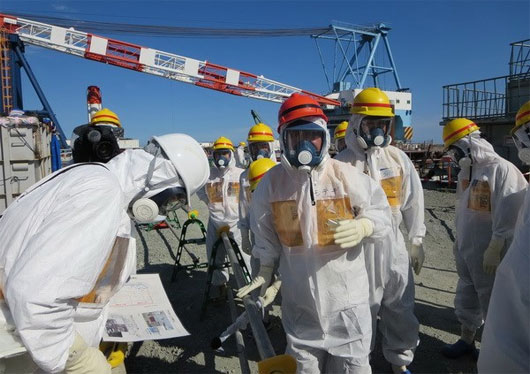New hope in treating radiation-infected patients
Exposure to high levels of radiation due to exposure to radioactive substances leaked from a good nuclear power plant from an atomic bomb explosion often causes serious damage to the victim's body and possibly leading to death.
>>>Japan spent 970 million USD to build a place to store contaminated soil
Recently, however, scientists say a new drug, called DMOG, is being developed that can help patients with severe radioactivity prolong life, and open up new hope in things. treatment for patients with cancer.
In a study published in Science Translational Medicine on May 14, scientists from Stanford University in the US tested the effects of two proteins called HIF1 and HIF2 in preventing as well as minimizing damage to the body, especially the intestinal tract, for high-level radioactive mice.
First, the researchers used genetically modified mice to suppress the enzyme PHD, which is able to control the stability and development of the two proteins.
Results showed that 70% of genetically modified mice could survive at least 30 days after their abdominals were exposed to high levels of radiation, while 27% survived at least 30 days after the whole muscle. can be contaminated with radiation.

Measuring high radioactivity at Fukushima power plant, Japan.(Photo: AFP / VNA)
Next, scientists continued to give normal mice DMOG drugs - to help inhibit the activity of PHD enzyme - before exposing them to radiation.
They found that 67% of them could live at least 60 days after being exposed to high levels of radiation in the abdomen and 40% survived at least 30 days after the whole body became seriously contaminated.
DMOG treatment for infected mice after 24 hours also yielded positive results when the drug helped accelerate the recovery of injuries in the body.
Meanwhile, in both cases, normal mice died within 10 days of severe radiation exposure. The study also found that HIF2 protein plays a more active role than HIF1 in protecting the body from radiation exposure.
Despite the astonishment of the ability to protect the body and heal the damage of DMOG and HIF1 and HIF2 proteins to radioactive mice, scientists still believe that more research is needed. more because mice are more resistant to the effects of radiation than humans.
However, they also assessed the research and understanding of the DMOG mechanism as an invaluable document, contributing to the development of new treatments for radiation-infected patients, while helping to minimize the The toxin that cancer patients may be affected when treated with radiotherapy.
Besides the great effects in industry and medicine, radioactive substances and radiation also cause extremely dangerous consequences for human health if the impact exceeds the safety limit. When the body is exposed to radiation, patients can suffer from diseases such as redness, desquamation, granulocytopenia, cancer, infertility.
Radiation infection causes the body to fail to repair itself properly, leading to many risks of genetically altering the body, causing many dangerous illnesses and being able to leave genetics for generations. In addition, large levels of radiation exposure also cause skin burns, which can even lead to death.
- New research on beverages helps HIV-infected patients live longer
- New hope in treating Parkinson's
- Early detection and treatment of TB for HIV-infected people
- Ninh Thuan: 20 more patients infected with gastrointestinal virus
- New hope for kidney failure
- The US approves organ transplants from HIV-infected patients
- Indonesia: 2 more patients infected with bird flu
- New developments in HIV treatment research
- Disaster of the HIV-infected organ transplant for 5 patients
- How dangerous is radiation?
- Therapy saves 80% of radiation victims
- The Ebola virus journey destroys the human body in an obsessive image
 Green tea cleans teeth better than mouthwash?
Green tea cleans teeth better than mouthwash? Death kiss: This is why you should not let anyone kiss your baby's lips
Death kiss: This is why you should not let anyone kiss your baby's lips What is salmonellosis?
What is salmonellosis? Caution should be exercised when using aloe vera through eating and drinking
Caution should be exercised when using aloe vera through eating and drinking Mutant creatures living in the Chernobyl exclusion zone
Mutant creatures living in the Chernobyl exclusion zone  First discovery of life-preserving magnetosphere outside the Solar System
First discovery of life-preserving magnetosphere outside the Solar System  Close-up of the process of 'making' cancer radiation therapy masks
Close-up of the process of 'making' cancer radiation therapy masks  New species of water bear reveals the secret of immortality
New species of water bear reveals the secret of immortality  Device for generating electricity at night from infrared radiation
Device for generating electricity at night from infrared radiation  Wild 'paradise' nearly 40 years after the Chernobyl nuclear disaster
Wild 'paradise' nearly 40 years after the Chernobyl nuclear disaster 